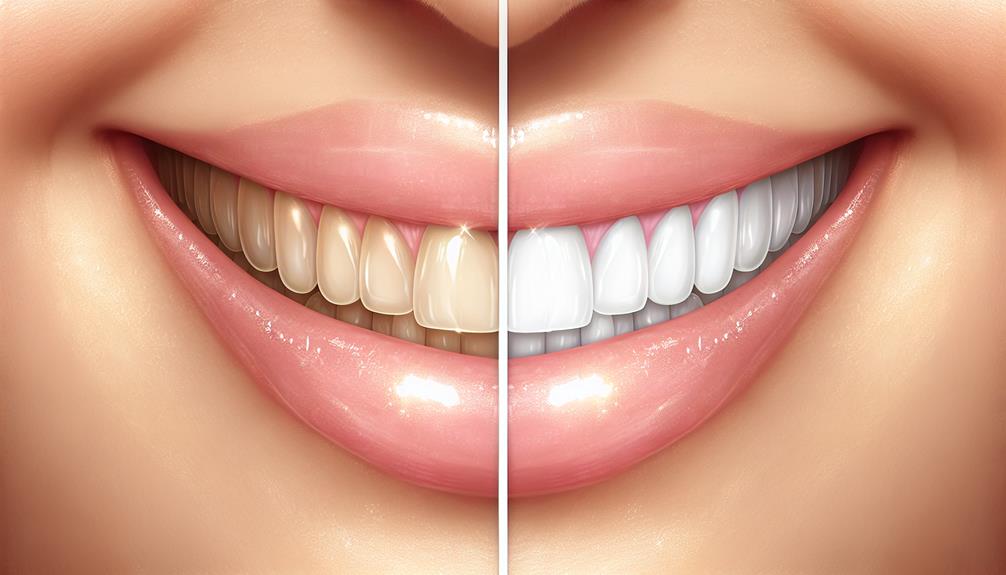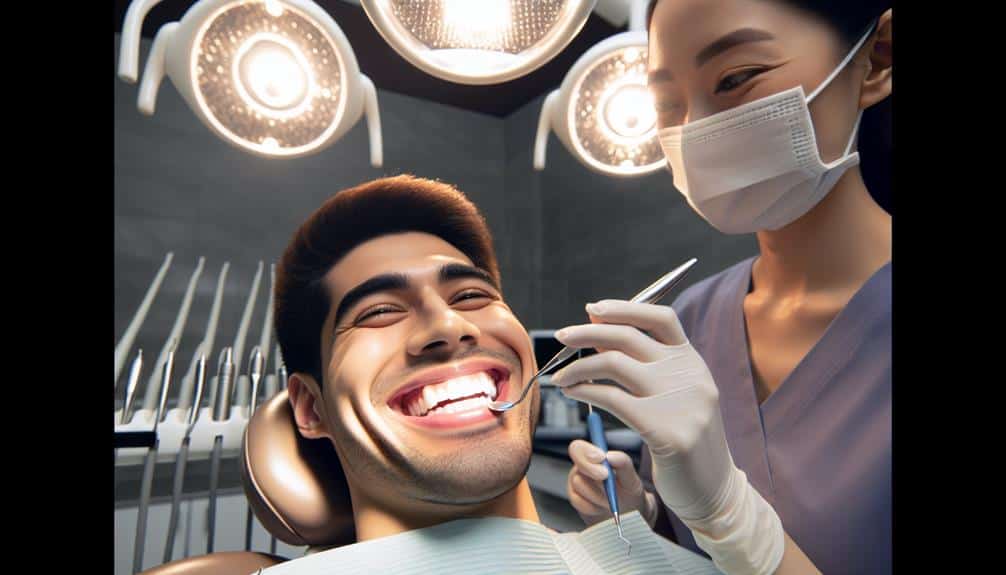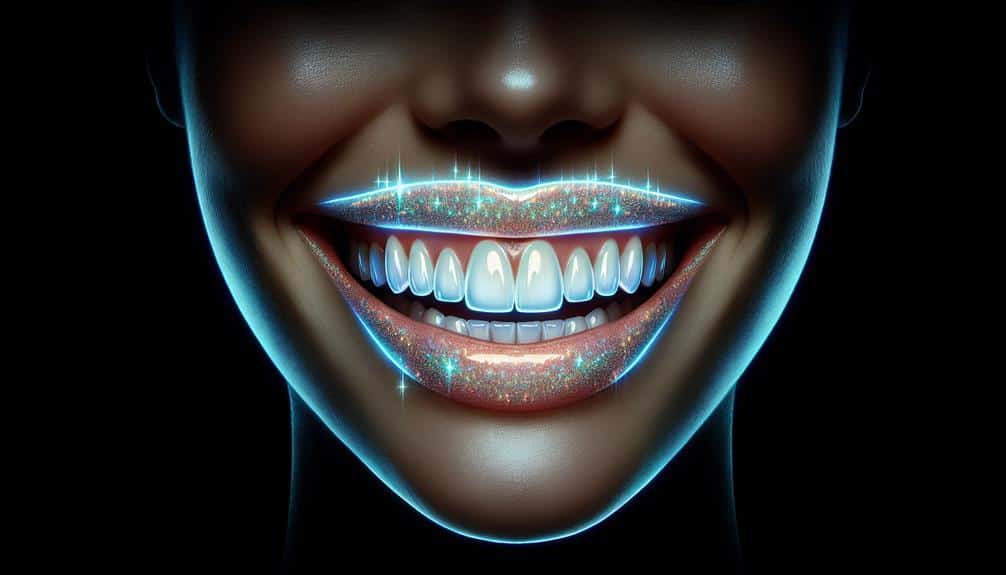When comparing professional whitening to DIY kits, experts suggest that professional treatments offer stronger bleaching agents applied by trained professionals for immediate and effective results. While DIY kits may be more cost-effective upfront, they could require consistent use and lack the potency of professional treatments, potentially leading to shorter-lasting outcomes. Safety considerations like tooth sensitivity and gum irritation should be taken into account regardless of the chosen method. Keep in mind the importance of budget, desired results, and convenience when deciding between the two options. Explore further to understand the nuances of these choices.
Key Points
- Experts recommend professional whitening for immediate and lasting results.
- DIY kits may offer short-term cost savings but require consistent use.
- Professional treatments use higher quality agents for more effective whitening.
- Safety risks like tooth sensitivity are present in both professional and DIY methods.
- Consider budget, desired outcome, and convenience when choosing between professional and DIY whitening options.
Pros and Cons of Professional Whitening
Utilizing professional whitening services offers a thorough and efficient method for achieving a brighter smile but comes with its own set of advantages and disadvantages. Expert recommendations often highlight the effectiveness of professional whitening procedures in delivering noticeable results in a shorter period compared to at-home kits. The controlled environment of a dental office guarantees that the whitening agents are applied correctly, minimizing the risk of uneven whitening or gum irritation.
Consumer satisfaction plays a significant role in the preference for professional whitening. Patients often report a higher level of satisfaction with the results achieved through professional services due to the expertise of trained professionals and the use of stronger whitening agents. The personalized approach taken by dental professionals also allows for tailored treatments based on individual needs, leading to more consistent and predictable outcomes.
However, the cost associated with professional whitening can be a deterrent for some individuals. While the results are often superior, the price may not be as accessible as at-home alternatives. Additionally, the time commitment required for multiple in-office sessions may not align with everyone's schedule. It's essential to weigh these factors against the benefits when considering professional whitening services.
Cost Comparison: Professional Vs. DIY Kits
When comparing the costs of professional teeth whitening services with DIY kits, it's vital to take into account various factors before making a decision.
Professional whitening procedures are often more expensive upfront compared to purchasing a DIY kit. However, the cost effectiveness of each option can vary depending on the results you desire and the longevity of the whitening effect.
DIY kits are generally more cost-effective in the short term, offering at home convenience without the need for multiple dental visits. On the other hand, professional whitening treatments performed by a dentist may provide more significant and longer-lasting results, potentially making them more cost-effective in the long run.
Additionally, professional whitening services often use higher quality whitening agents and tailored treatment plans, which can contribute to their higher initial cost but also to potentially better results. Consider your budget, desired outcome, and convenience when deciding between professional whitening and a DIY kit.
Safety Considerations for Whitening Treatments
To guarantee the safety of your whitening treatments, it's important to carefully follow the instructions provided with the selected method. Potential risks associated with whitening treatments include tooth sensitivity, gum irritation, and damage to tooth enamel if not used correctly. Safety measures such as using the recommended amount of whitening product, avoiding prolonged exposure to whitening agents, and consulting your dentist before starting any treatment can help minimize these risks.
Precautions like checking for any existing dental issues before whitening and following the recommended treatment schedule are essential for a safe whitening experience. It's important to be aware of any concerns related to over-the-counter whitening products, such as incorrect product usage or allergic reactions. By being mindful of these safety considerations and taking necessary precautions, you can ensure that your whitening treatment isn't only effective but also safe for your overall oral health.
Effectiveness of Professional Whitening Vs. DIY Kits
For a thorough comparison of the effectiveness of professional whitening and DIY kits, consider the following key factors:
- Home Remedies: DIY kits often include home remedies like baking soda or activated charcoal. While these can be effective to some extent, professional whitening treatments typically use stronger and more concentrated bleaching agents, providing quicker and more noticeable results.
- Efficacy: Professional whitening procedures are performed by trained professionals who've access to high-quality products and advanced techniques. This can lead to more effective and long-lasting results compared to DIY kits, which may not always deliver the desired level of whitening.
- Time Commitment: Professional whitening treatments are usually completed in a single session or a few sessions, offering immediate results. DIY kits, on the other hand, require consistent and prolonged use over several days or weeks to achieve similar outcomes.
- Convenience: While professional whitening may require scheduling appointments and visiting a dental office, DIY kits provide the convenience of whitening your teeth at home. However, the convenience of DIY kits may come at the cost of effectiveness and long-term results.
Long-Term Results: Professional Vs. DIY Whitening
Considering the difference in effectiveness between professional whitening and DIY kits, it's important to evaluate the long-term outcomes of each method for achieving a lasting whitening effect on your teeth. Professional whitening treatments often provide more noticeable and long-lasting results compared to DIY kits. While DIY kits can initially whiten teeth, the outcomes may not be as enduring due to lower concentrations of whitening agents.
Potential risks associated with professional whitening include tooth sensitivity and gum irritation, which are usually temporary and can be managed with desensitizing toothpaste or mouthwash. On the other hand, some DIY kits may lead to uneven whitening or damage to the tooth enamel if not used correctly.
To maintain your whitened teeth long-term, it's essential to follow good oral hygiene practices such as brushing your teeth twice a day, flossing regularly, and avoiding foods and drinks that can stain your teeth. Additionally, scheduling regular dental check-ups can help monitor the condition of your teeth and address any concerns promptly.
Frequently Asked Questions
Are There Any Specific Dietary Restrictions to Follow After Undergoing Professional Whitening Treatments?
After undergoing professional whitening treatments, follow specific dietary restrictions for best results. Post-treatment care involves avoiding dark-colored foods and beverages that may stain teeth. Manage sensitivity by consuming lukewarm foods and drinks to minimize temperature fluctuations.
Can Professional Whitening Treatments Cause Sensitivity to Hot or Cold Temperatures in the Teeth?
After professional whitening treatments, you may experience sensitivity to hot or cold temperatures in your teeth. Manage it by using toothpaste for sensitive teeth and avoiding extreme temperatures. Professional treatments tend to be more effective but cost more than DIY kits.
Are There Any Long-Term Effects on Tooth Enamel From Using DIY Whitening Kits?
When using DIY whitening kits, you risk enamel damage due to harsh chemicals. These home remedies may provide short-term results but can lead to long-term enamel erosion. Protect your enamel by choosing professional whitening treatments for safer and more effective results.
How Often Should Touch-Up Treatments Be Done After Completing a Professional Whitening Session?
After completing a professional whitening session, touch-up treatments should be done every 6-12 months to maintain your bright smile. Consistent upkeep guarantees the longevity and effectiveness of your whitening results, keeping your teeth radiant.
Can Professional Whitening Treatments Help With Removing Stubborn Stains Caused by Smoking or Consuming Dark-Colored Beverages?
Professional whitening treatments can effectively remove stubborn stains from smoking or dark beverages. While whitening toothpaste may help, natural remedies like home kits might not be as potent. Consider professional treatment for more significant results.




